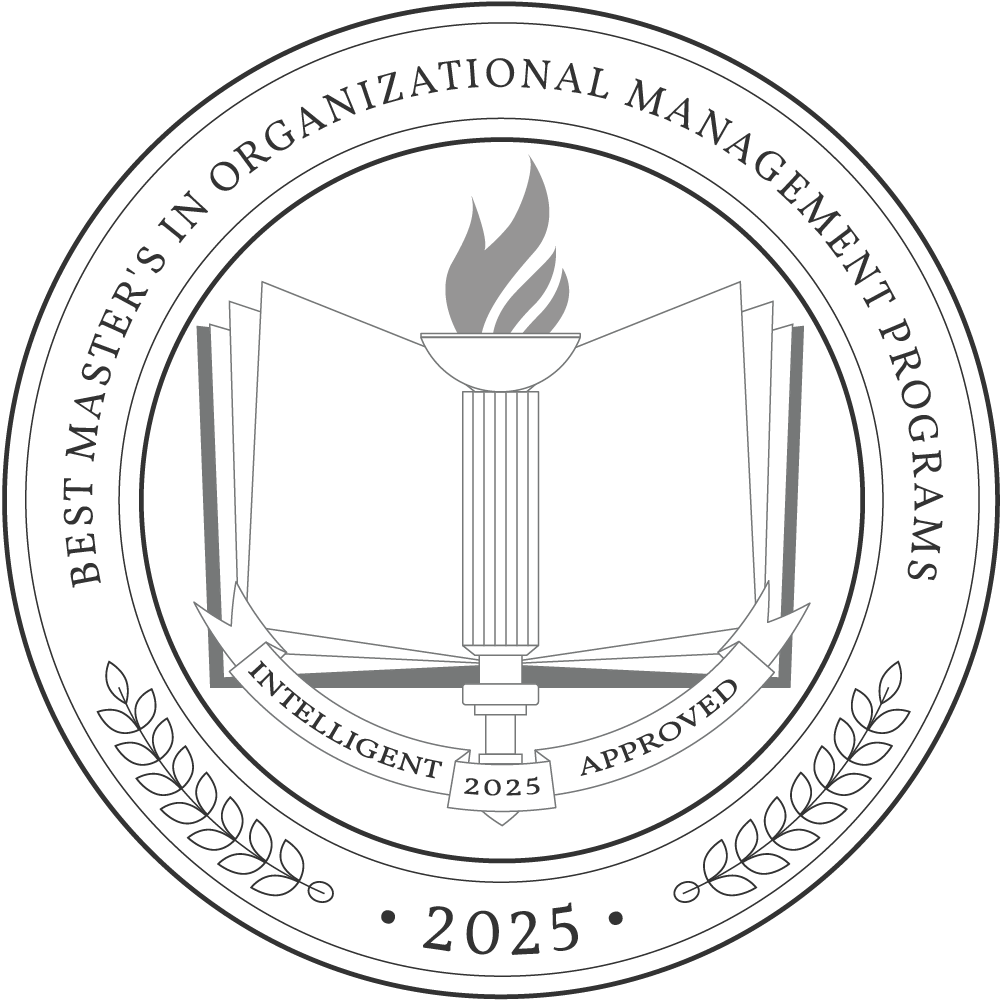A master’s in organizational management degree prepares graduates for careers requiring strong leadership skills. Potential roles include human resources manager, training and development manager, and school principal. The Bureau of Labor Statistics (BLS) reports that the median annual salary for these roles ranges from $101,320 to $130,000.
For full-time students, it typically takes two years to complete a master’s in organizational management. During the 2020-2021 academic year, the average tuition for an in-state student was $19,749, according to the National Center for Education Statistics. At the average tuition rate, it would cost $39,498 to complete this type of degree in two years.
Why Trust Us
The Intelligent.com Higher Education Team is dedicated to providing students with independent, equitable school and program rankings and well-researched resources. Our expert-driven articles cover topics related to online colleges and programs, paying for school, and career outlooks. We use data from the U.S. Department of Education’s College Scorecard, the National Center for Education Statistics, and other reputable educational and professional organizations. Our academic advisory team reviews content and verifies accuracy throughout the year for the most current information. Partnerships do not influence rankings or editorial decisions.
- Analyzed over 2,000 national, accredited, and nonprofit colleges and universities
- 800+ rankings pages are reviewed and updated yearly
- Content is informed by reputable sources, surveys, and interviews with academic advisors and other experts
- Over 100 data points are reviewed for accuracy and quality throughout the year, including sources
How we rank schools
Our list features the best Organizational Management degree programs at top colleges nationwide. Each school featured is a nonprofit, accredited institution — either public or private — with a high standard of academic quality for post-secondary institutions.
We evaluated each school’s program on tuition costs, admission, retention and graduation rates, faculty, reputation, and the student resources provided for online students. We collected data from trusted sources like the National Center for Education Statistics, individual school and program websites, school admissions counselors, and other data sources. Then, we calculated the Intelligent Score on a scale of 0 to 100 based on the following criterion:
Academic Quality:
- Admission rate versus enrollment rate
- Retention rate of students who return after year one
- Accreditation status (regional and programmatic)
- Nonprofit status, both private and public institutions
Graduation Rate
- Overall graduation rate
- Total number of currently enrolled students, including diversity metrics
- Student-to-faculty ratio
Cost and ROI
- In-state and out-of-state per-credit tuition rates and fees
- Required credits to graduate
- Earning potential after graduation
- Availability of federal student loans, scholarships, and other financial aid options
Student Resources
- Available student services for online-only and hybrid programs
- On-campus amenities like tutoring centers and the number of libraries
Read more about our ranking methodology.
Best 8 Accredited Master’s in Organizational Management Programs
FiltersInstitution Type
Status
- Intelligent Score
- Alphabetically By University Name
- Acceptance Rate
- Enrollment
- In-state Graduate Tuition
- Out-of-state Graduate Tuition
- In-state Undergraduate Tuition
- Out-of-state Undergraduate Tuition

Our Lady of the Lake University
Intelligent Score: 99.08In-state: $29,038
Out-of-state: $29,038
In-state: $16,650
Out-of-state: $16,650
SAT: 890-1060
ACT: 15-20
$981
On-Campus, Online, Hybrid
Accreditation Council for Business Schools and Programs
30

University of Wisconsin Platteville
Intelligent Score: 97.56In-state: $9,273
Out-of-state: $37,161
In-state: $10,728
Out-of-state: $10,728
SAT: 1260-1460
ACT: 27-32
$750
On-Campus
Higher Learning Commission
30-36

Lewis University
Intelligent Score: 97.45In-state: $34,268
Out-of-state: $34,268
In-state: $14,580
Out-of-state: $14,580
SAT: 1010-1220
ACT: 21-27
$725
On-Campus
Higher Learning Commission
30

Pacific Oaks College
Intelligent Score: 95In-state: $11,692
Out-of-state: $11,692
In-state: $38,328
Out-of-state: $38,328
SAT: Not Required
ACT: Not Required
$1,210
On-Campus, Online
WASC Senior Colleges and Universities Commission
36

Saint Joseph’s University
Intelligent Score: 92.49In-state: $39,636
Out-of-state: $39,636
In-state: $14,328
Out-of-state: $14,328
SAT: 970-1170
ACT: 22-24
$1,192
On-Campus, Online, Hybrid
Middle States Commission on Higher Education
30

Saint Louis University
Intelligent Score: 91.48In-state: $46,400
Out-of-state: $46,400
In-state: $21,420
Out-of-state: $21,420
SAT: 1160-1370
ACT: 25-31
$790
On-Campus, Online
Higher Learning Commission
33

George Washington University
Intelligent Score: 91.27In-state: $55,961
Out-of-state: $55,961
In-state: $31,770
Out-of-state: $31,770
SAT: 1270-1450
ACT: 30-33
$1,870
On-Campus, Online
Middle States Commission on Higher Education
30

Northwestern University
Intelligent Score: 91.03In-state: $58,227
Out-of-state: $58,227
In-state: $56,067
Out-of-state: $56,067
SAT: 1430-1550
ACT: 33-35
$1,697
On-Campus
Higher Learning Commission
46
How to Choose a Master’s in Organizational Management Program
Choose your area of study
Organizational management is a broad area of study, so many students choose to specialize. For example, if you’re interested in obtaining a leadership role within an accounting firm, you may be able to minor in accounting.
Some schools offer specializations in change management, performance management, or business communications. With so many options available, it’s possible to tailor a master’s in organizational management to your specific career goals.
Research schools and programs
Although your area of study is an important consideration, it’s not the only thing you need to think about. As you build your list, consider whether you want to attend online or in-person classes, how much you can afford to spend on tuition and fees, what type of accreditation the school should have, and what type of class schedule fits your needs.
For each program on your list, get answers to the following questions:
- How many credits are required to complete a master’s in organizational management degree?
- Will it take longer to complete the program if you choose to focus on a specific area of study?
- Do students have to complete an internship or some other type of professional experience?
- Do faculty members have specialized experience in your target industry?
Prepare for tests and applications
Some schools require applicants to submit GRE or GMAT scores. The GRE has questions related to critical thinking, verbal reasoning, and quantitative reasoning. It also assesses your analytical writing skills. The GMAT has similar questions, but it’s designed specifically for students with an interest in business and management. If you haven’t taken a standardized test since high school, brush up on your test-taking skills by working with a tutor or joining a study program.
Many programs also require applicants to submit letters of recommendation, college transcripts, letters of intent, and other materials. To improve your chances of success, start gathering these materials as early as possible.
Select your program
If you qualify for admission to several schools, think carefully about which one is the best fit for your needs. For example, if you want to complete an internship at a Fortune 500 company, a program in a major city is probably a better fit than a program in a rural area. It’s also important to consider the number of specializations available, the cost of the program, and the availability of in-person or online classes.
Before you commit to a program, meet with at least one current student. Ask plenty of questions about the quality of the courses and the number of internship opportunities available.
Determine how you’ll pay for your degree
The final step is to determine how you’ll pay for your degree. If you plan to pay cash, make sure you know the total cost of the program — not just the tuition rate. Some students qualify for financial assistance based on their military service or employment status. Research these options carefully before you enroll.
If you want federal loans or grants, complete the Free Application for Federal Student Aid. The FAFSA helps determine your eligibility for federal education funding.
What Can You Expect From a Master’s in Organizational Management Program?
It takes approximately 2-5 years to complete a master’s degree in organizational management, depending on whether you take full-time or part-time classes. Each program has different requirements, but students typically complete courses in business ethics, change management, organizational behavior, leadership, and strategic planning.
Once you complete your core courses, you may have the opportunity to enroll in several electives. For example, if you’re interested in working as a human resources manager, you may want to take employment law, labor relations, industrial psychology, and other HR courses.
Note that some programs have thesis or internship requirements. If you have to write a thesis, you may need to complete at least one course in research methods beforehand. Some schools require additional courses in statistics, critical thinking, and other disciplines. Each institution has its own internship requirements, but students typically need to complete a minimum number of work hours before graduating.
Potential courses you’ll take in a master’s in organizational management program
- Business Ethics. Students take business ethics to learn how to make ethical decisions under various conditions. A business ethics course usually focuses on common approaches to ethics, the importance of ethical decision-making, and the consequences of violating corporate ethics policies.
- Change Management. Every organization deals with change at some point. Change management courses prepare students to manage these changes effectively. Topics covered include the principles of change management, motivational theories, and the importance of leadership in the context of change.
- Organizational Behavior. Organizational behavior refers to how individuals behave when they’re organized into groups. In an organizational behavior course, students typically learn about corporate culture, diversity, communication, negotiation, and conflict resolution. It’s common for organizational behavior courses to include role-playing, giving students the opportunity to apply theoretical principles to a variety of practical situations.
- Strategic Planning. Strategic planning is essential for setting goals and determining where employees should focus their energy. In this type of course, students learn how to develop a business strategy, engage in strategic thinking, and use resources effectively.
- Leadership Theory. No single leadership style works in every situation, so many organizational management programs include courses to help students understand multiple leadership theories. Course topics include strategic leadership, trait theory, contingency theory, and the pros and cons of each leadership style.
Master’s in Organizational Management Degree Frequently Asked Questions
How do I apply to a master's in organizational management degree program?
Before you apply, talk with an admissions counselor at your preferred school. Admissions staff have in-depth knowledge of the application and acceptance requirements and can provide information tailored to your circumstances.
When you have everything you need, follow the application instructions carefully. You may need to complete an application form, submit letters of recommendation, write a letter of intent or an admissions essay, and submit GRE or GMAT scores.
How much does a master's in organizational management degree cost?
According to the National Center for Education Statistics, the average in-state tuition rate for a master’s in organizational management is $19,749 per year. Of course, the total cost of a degree depends on how long it takes you to complete the program.
You also need to think about course fees and living expenses. For example, some schools charge a premium for online courses because it costs money to install and maintain the technology needed to deliver course materials across long distances. You may also need to move to a new town, rent an apartment, and pay for other expenses.
How long does it take to earn a master's in organizational management degree?
It takes approximately two years of full-time study and four to five years of part-time study to complete a master’s in organizational management degree. The total length of a program depends on how many credits you need to complete and whether you plan to complete your classes online or in person.
Some online programs are longer or shorter than their corresponding on-campus programs. For example, you may have to complete a residency requirement after you finish your online classes, increasing the length of the program.

